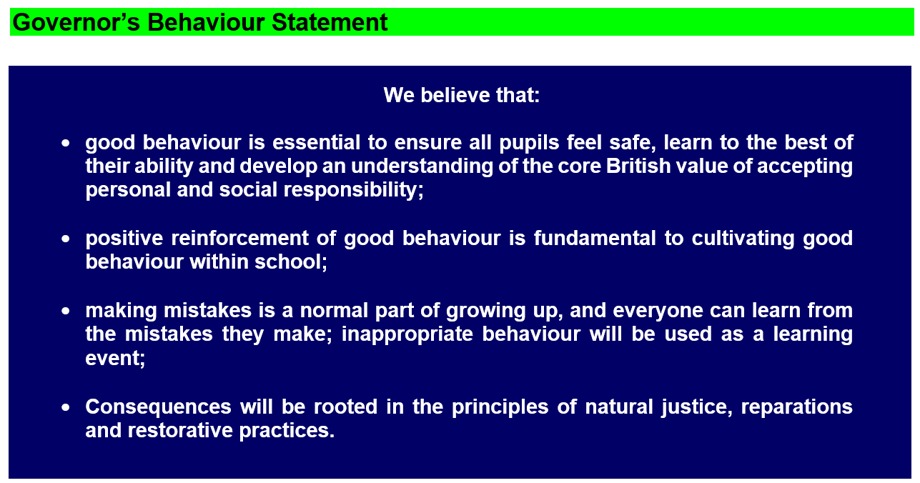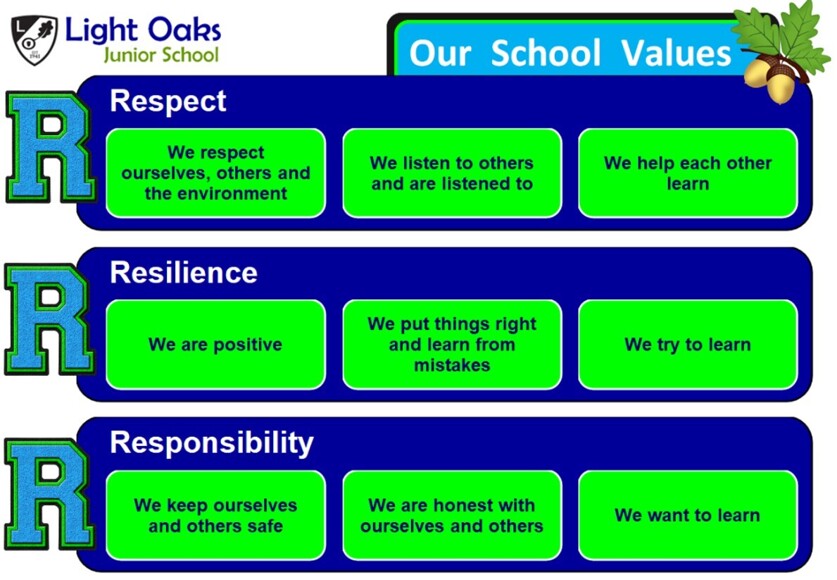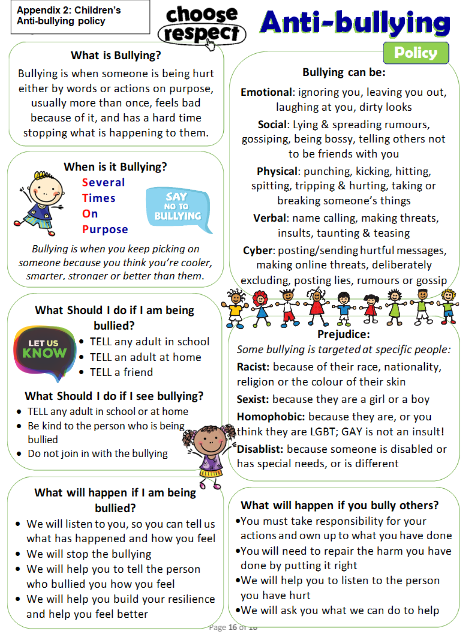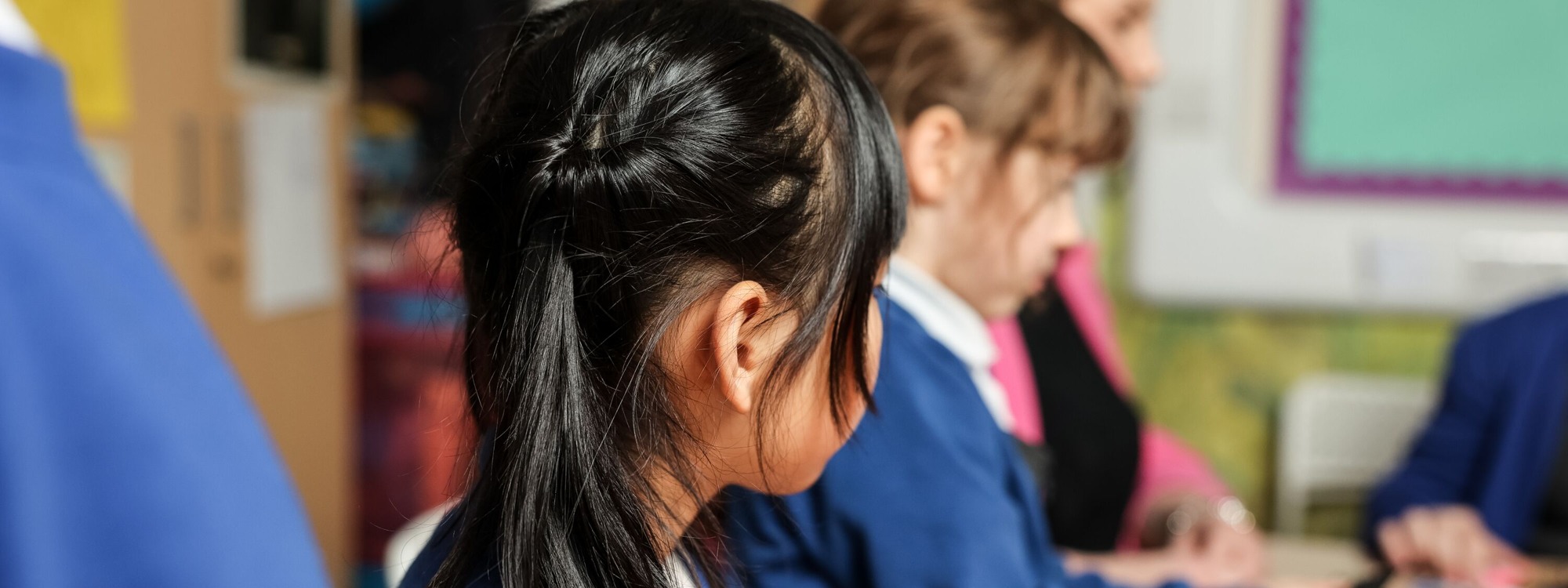- Home
- Key Parent Information
- Behaviour and Bullying
Behaviour and Bullying
Rationale
Our trauma-aware behaviour policy is based on the school key values of:
RESPECT, RESILIENCE & RESPONSIBILITY
We use these key values to discuss negative behaviour, but more importantly, to encourage positive behaviour. Our policy is informed by psychological research and the latest behavioural studies, including work from the Education Endowment Foundation. Their behaviour guidance can be accessed HERE. Government guidance can be accessed HERE.
Behaviour
Behaviour
Our School governors have set out a number of behaviour principles to inform our approach to behaviour:

The shared values of respect, responsibility and resilience drive our high expectations of behaviour, personal development and learning across our school community. We encourage success by supporting everyone to meet the following expectations:

We promote behaviour throughout the school day, both explicitly in wellbeing lessons, and indirectly through the inclusive and positive school ethos outlined in our school values, by embedding behaviour expectations within all aspects of school life. We use many strategies to develop good behaviour, utilizing the curriculum, praise and reward, enrichment and by constantly promoting our positive school culture and values.
Learning from incidents and consequences
All behaviour incidents are treated as learning events. Children are asked to think about what has happened and we support them to change their behaviour. We always try to help children by giving them strategies to use to help them if a similar event occurs again. We use restorative practices, reflection and natural/logical consequences where appropriate (if a child spills paint on the floor, they are asked to clean up the mess; if they vandalise a book, they are asked to replace it; if they are disrespectful to another child, they will be asked to do something respectful to atone for this).
We talk about consequences and make sure that children know that there is always a consequence, but we do not refer to this as punishment. We do not punish children when a behaviour incident has occurred; we model empathy, forgiveness and support pupils to accept responsibility, show resilience in the face of guilt or shame and respect others by apologising and learning from the incident. In the same way that we do not punish pupils who get a maths problem wrong, we do not punish pupils who get behaviour wrong.
We recognise that, as young children, our pupils are still learning and that negative behaviours are often due to a lack of understanding, a lack of self control or sometimes because of a condition or circumstance out of their control. Our aim is to help ALL children to learn how to behave well - including those who behave in a way which is not acceptable in our community.
We always seek to praise in public, but we discuss negative behaviour in private. We actively discourage pupils from seeking retribution, punishment or shaming of other pupils as this is neither resilient, responsible nor respectful.
Parents
We seek to discuss any negative behaviour with parents, so that we can all work together to keep our school a safe place to be. However, some low level negative behaviours will not require a discussion with parents; pupils may simply need a reminder about what respectful behaviour is.
Further information, including how we investigate behaviour incidents can be found in our behaviour policy on the polcies page of our website.
Bullying
Bullying, harassment and intolerant behaviour
There is no legal definition of bullying. However, we define bullying as behaviour that is:
- repeated and pre-meditated
- intended to hurt someone either physically or emotionally
- often aimed at certain groups, for example because of race, religion, gender or sexual orientation
- involves an imbalance of power - it is one-sided
This definition is in line with the guidance given by the Department for Education HERE and HERE, and incorporates advice from the Anti Bullying Alliance HERE and the National Bullying Helpline HERE.
We do not tolerate bullying, or any form of discrimination or harassment in our school. We will always deal with incidents which we identify as bullying, or potential bullying, thoroughly. We keep detailed logs of any such incidents and we monitor these closely to ensure our children are kept safe. Children are taught about bullying, what to do, who to speak to and how to respond if it happens to them or to a friend and we encourage them to tell an adult if they are upset, worried or scared. We encourage all parents to reinforce our message of telling someone if their child, or someone else, is being bullied and we are always happy to discuss any concerns parents may have over this.
Please remember that our children are still learning how to behave in a community and trust that we will do the best we can to make sure all children learn from any incidents that occur.
Preventative Measures: promoting positive behaviour
At Light Oaks Junior School, we utilise a variety of strategies to prevent bullying from occurring, to promote kindness and to pupils have the skills to recognise and respond to bullying if it occurs. We have a comprehensive anti-bullying approach, and we continue to add to this list when new research emerges. Examples of our approach are:
- A whole school ethos and values: Respect, Resilience and Responsibility
- Building and maintaining trusted, caring relationships
- Teaching about wellbeing, mental health and social/emotional learning
- Promotion of anti-bullying messages throughout the school year
More information can be found in our anti-bullying policy below. A children's policy has also been developed:

How we deal with more complicated behaviour incidents including suspected harassment or bullying
All behaviour incidents are investigated thoroughly, either by the class teacher, the Assistant Head Teachers or the Deputy Head. We always speak to children individually to try to get an overview of what has happened, and we do this in as supportive a way as possible. We will ask everyone involved (including any witnesses) their view and sometimes, if there are conflicting accounts, we will bring the children together to enable us to get an agreed version of events. All children are treated sensitively and with dignity and are supported throughout the investigation and afterwards if necessary.
Restorative Practices: we will always try to use mediation to resolve any issues between children, unless there is a good reason why this cannot happen (e.g. wishes of the child or children unable to access this type of work), and in cases of bullying, or suspected bullying, we encourage the children involved to meet and discuss the problem, with a trusted adult as mediator. This serves several purposes:
1. The power is taken away from the person who has bullied and it is given to the person who has been bullied
2. The person who has been bullied is given the confidence to stand up to the person who bullies
3. Everyone involved knows that the problem has been dealt with and it will not be tolerated
If problems continue
In all cases of bullying or harrassment, support is given to all parties involved. We will work with the victim to ensure they are happy and the matter is resolved, and to support their social relationships, and we will work with the perpetrator to ensure they learn from the incident/s. In both cases, we will work with the children to support their wellbeing and mental health. Please remember that the vast majority of pupils who show bullying behaviour need help too.
However, if a child continues to bully, harass or discriminate, we will consider more drastic actions and support as detailed in the behaviour policy, including temporary or permanent exclusion.
Find out more
More information can be found in our anti-bullying policy on our policies page.
If you have a concern about bullying, you can speak to our anti-bullying champion Mrs Walker who can be contacted at school:
0161 921 1690lightoaks.juniorschool@salford.gov.ukContact us



